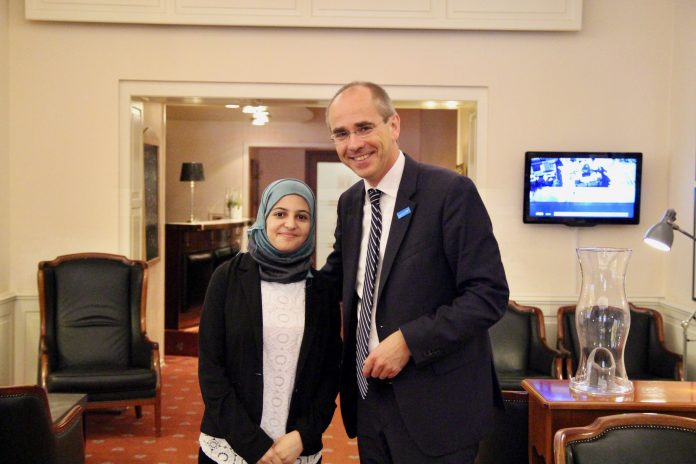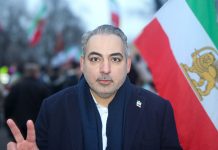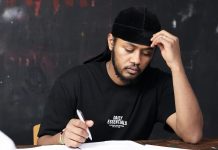Besides the leaders of the G20 countries, NGOs participated at the summit as guests. FINK.HAMBURG talked to UNICEF Goodwill Ambassador Muzoon Almellehan and Christian Schneider (Executive Director, UNICEF Germany) about their aims for the G20 agenda.
Muzoon Almellehan is Unicef`s youngest ever Goodwill Ambassador since June. She is a 19-year-old education activist and Syrian refugee, who fled Syria in 2013. Muzoon lived in refugee camps for three years during which time she began campaigning with UNICEF for the rights of children to education. She now lives in the UK with her family .
What is your main mission here at the G20-summit?
Muzoon Almellehan: My mission here is to represent the children as the Unicef Goodwill Ambassador. I want to focus on the needs of children and the fact, that education is the most important need for children. The leaders have to put education on the top of the G20 agenda, because education gives us stability and children skills, as well as the countries they live in.
How are you involved in the summit? What is your position during the summit?
M.A.: I was at the Global Citizen Festival and spoke in front of many people about education and refugees. I told them my message: That education is really important. I also have high-level meetings. I met with the prime minister of Norway and with Angela Merkel. I met her yesterday and she was great. She gave me the opportunity to tell her my own story as a refugee. This morning I had a meeting with Mark Rutte, the prime minister of the Netherlands. We talked about education and how important it is for children.
Are you allowed to participate at the meetings during the summit?
M.A.: No, we have our private meetings to proclaim our messages. We also do that in media interviews and promote our messages via social media. We did a Facebook Live event. That is the way we try to promote our idea for the agenda.
What is your main focus about being the goodwill ambassador of Unicef?
M.A.: My main role is to protect children who are living in emergencies, and those who are pertained by war, conflict, poverty, violence and also climate change. My mission is to represent them, to talk about them and convince world leaders to help them. We need solidarity between all the countries to provide education for every child in the world.
Do you think that you were able to convince Angela Merkel with your message?
M.A.: Yes. When I spoke with her yesterday she was really interested in listening to me talking about education. She promised, they will do as much as they can. Germany already did amazing activities for refugees. They gave them opportunities and Germany is trying their best to support education for refugees, which is really important. I wish other countries will follow Germany in the way they are supporting refugees. I hope to see a positive impact from Germanys way of handling the situation.
In which way is Unicef a part of the G20-Summit?
Christian Schneider: As Muzoon was saying, we came here with a clear agenda. The agenda is on education. Again, education is a part of the six-point agenda that Unicef has drafted to attract the G20 attention to the situation of children in crisis and refugee situations. That starts with really asking for protection for every child in Syria, on the move in Libya or Jordan or already in hosting countries like UK or Germany. Secondly, we urge the leaders to make education happen for every child in the world, but particular for children in these situations. We specifically ask that every child has the right to be united with its family. Muzoon is in the lucky situation that she came over from Syria with her family. The G20 agenda also needs to be added by all measures against xenophobia. And we have to work on the root causes for fleeing.We really urge leaders to continue with their diplomacy on Syria and South Sudan, Somalia and other places of war. And of course to invest in the fight against poverty. We just recently found out that the lack of access to education has been a drive for children and their parents to flee. 38% of the children said, that they don’t have access to school and lack many years of education.
Lots of NGOs critices the G20-Summit. Why do you think it is important to take part?
C.S.: Today it is not clear that we all have one global agenda and we have many pressing issues. So we need to use every opportunity where the leaders meet. At the G20 summit many very important leaders meet to raise attention for global issues and solutions for them. And education is one of them. If we cannot bring them to the agenda it is a lost game. This gathering of leaders is a unique opportunity for us and other NGOs to bring this to the table. What leaders decide here has consequences for the young generation. The G20 represents two thirds of the world’s population. Unicef and Muzoon for Unicef are representing children, which are one third of the population. They probably have to face most of the consequences of the political decisions: two billion young people in the world. We think: Yes, it is important that they meet and discuss these issues. But it is very important too, that the voice of civil society and organisations like Unicef and ambassadors like Muzoon is heard.
Catalina Langer, Jahrgang 1994, hat den damaligen Hamburger Bürgermeister Henning Voscherau schon einmal in die Nase gekniffen – mit drei Jahren. Nach ihrem Bachelor im Fach Europäische Studien aus Osnabrück kehrte sie wieder in ihre Heimat- und Lieblingsstadt zurück. Ihr Interesse für Politik führte sie bis in die Vereinigten Staaten, wo sie im US-Büro des „Stern“ arbeitete und im Rahmen von Hillary Clintons Wahlkampfveranstaltungen interessante Einblicke in die politische Kultur der USA bekam. Schon direkt nach dem Abitur reiste sie einmal um die Welt und bloggte von unterwegs über internationale Gärten. Catalina weiß aber auch, wie man den perfekten Milchschaum herstellt und sucht immer nach spannenden Restaurants.







![Hamburg prüft Ein Demoschild mit der Aufschrift: Recht[s]zeitig Prüfen. Jetzt.](https://fink.hamburg/wp/wp-content/uploads/2026/01/IMG_8743-2-218x150.jpg)
